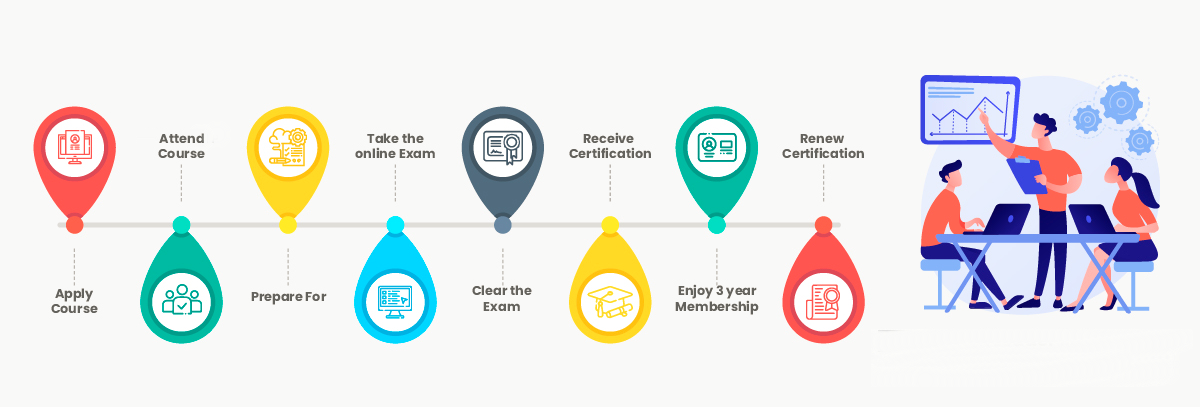
Agile using Scrum is a popular project management methodology that focuses on delivering value-added products through iterative and incremental development. In this training course, participants will learn how to use the empirical process of Scrum and work collaboratively to meet customer requirements. The Agile Project Management with Scrum course offered by Sambodhi and Education Nest provides an opportunity to get well-acquainted with Scrum practices and become proficient in managing Agile projects. The training is delivered by certified coaches through instructor-based classes. Upon completing the course, participants will be certified by Sambodhi and Education Nest for their understanding of Scrum and its applicability in Agile environments. This course is ideal for anyone involved in software development or project management who wants to enhance their skills and knowledge of Agile methodologies.
Application Deadline: Jun 30, 2023
Upskill for Your Dream Job
Sambodhi and Education Nest offer an Agile using Scrum Training Course designed to provide participants with a comprehensive understanding of Agile principles and the Scrum framework. This course adopts a live project-based training approach, allowing participants to apply Agile and Scrum concepts in real-world scenarios. With instructors having over 10 years of industry experience, participants learn from seasoned experts who have developed unique teaching styles to help aspiring candidates master the skills and knowledge required for successful Agile implementation. Throughout the course, participants gain insights into Agile methodologies, Scrum roles and ceremonies, backlog management, sprint planning, and iterative development. By completing this training, individuals can enhance their project management skills and contribute effectively to Agile teams in various industries.



Instructor-led Agile using Scrum live online Training Schedule
May 15th – Weekend
July 1st – Weekend
Why enroll for Agile using Scrum Certificate Training Course?


Growing demand for Agile using Scrum professionals as industries adopt Agile methodologies for efficient project management and success.

Agile using Scrum professionals are in high demand across industries and MNCs. According to PMI, 63% of hiring managers endorse Agile certifications, emphasizing its importance in project management success.

The salary for Agile using Scrum professionals depends on job role, experience, and location. Scrum Masters earn around $89,000, Product Owners earn $98,000, and Agile Coaches earn $100,000-$180,000 per year.
Agile using Scrum Training Course Benefits
The Agile using Scrum course offers numerous benefits to businesses and individuals. By completing this course, participants will obtain a professional certificate that serves as proof of their expertise in Agile project management using Scrum. This certification can boost their credibility and enhance their career opportunities in software development and project management. Additionally, participants will be equipped with the skills and knowledge needed to work effectively in Agile projects using the Scrum Framework. They will learn how to apply Scrum practices to manage projects and deliver value-added products in a collaborative, iterative, and incremental manner. This course is an excellent foundation for anyone interested in pursuing Agile and Scrum as their career path, providing them with the essential skills and knowledge required to succeed in this field.

Annual Salary

Hiring Companies
Want to become a Agile using Scrum Professional?
Why Agile using Scrum Certificate Training Course from Education Nest






Agile using Scrum Skills Covered
Agile using Scrum Training Course Syllabus
Agile using Scrum Training Projects

In the retail industry, Agile using Scrum projects have proven to be highly beneficial. The iterative and collaborative nature of Agile methodologies allows retail organizations to adapt quickly to changing customer demands and market trends. Agile enables cross-functional teams to work together effectively, resulting in efficient product development and faster time to market. With Scrum's emphasis on regular communication and transparency, retail companies can align their teams and stakeholders, ensuring everyone is on the same page throughout the project. Agile using Scrum also facilitates continuous improvement, allowing retailers to incorporate customer feedback and make necessary adjustments to deliver high-quality products that meet customer expectations. Overall, Agile using Scrum has become a valuable approach for driving innovation, enhancing customer satisfaction, and achieving success in the dynamic retail industry.

Agile using Scrum has gained significant popularity in the IT industry as an effective project management approach. By embracing Agile principles and employing the Scrum framework, IT teams can deliver projects more efficiently and adapt to changing requirements. Agile using Scrum projects in the IT industry emphasize collaboration, flexibility, and iterative development. Teams work in short sprints, focusing on delivering incremental value and receiving feedback from stakeholders. This iterative approach allows for quicker response to market demands, improved product quality, and enhanced customer satisfaction. Agile using Scrum projects also promote transparency, as regular communication and progress tracking ensure alignment and visibility across the team. Overall, Agile using Scrum has revolutionized project management in the IT industry, enabling teams to achieve greater productivity, efficiency, and successful project outcomes.
Agile using Scrum Training Description
The Agile using Scrum course offers a comprehensive training program for individuals looking to enhance their understanding of Agile principles and Scrum framework. This course provides participants with practical knowledge and skills required for successful Agile project management. Participants will learn about Agile methodologies, Scrum roles and ceremonies, backlog management, sprint planning, and iterative development. Through interactive sessions and real-world case studies, the course enables participants to apply Agile using Scrum concepts to their projects effectively. By completing the course, individuals can gain the necessary expertise to contribute to Agile teams, improve project outcomes, and adapt to the dynamic demands of the industry.
The objectives of the Agile using Scrum course are as follows:
Understand Agile Principles: Gain a clear understanding of Agile principles and values and their relevance in project management.
Master the Scrum Framework: Learn the key concepts, roles, and ceremonies of the Scrum framework and how they contribute to project success.
Learn Agile Project Management: Acquire knowledge and skills to effectively manage Agile projects, including backlog management, sprint planning, and iterative development.
Enhance Collaboration and Communication: Develop the ability to foster collaboration and effective communication within Agile teams to promote better decision-making and productivity.
Adapt to Changing Requirements: Learn techniques to handle evolving requirements and embrace change in a flexible and responsive manner.
Improve Time-to-Market: Discover strategies to accelerate project delivery by implementing Agile methodologies and Scrum practices.
Increase Stakeholder Satisfaction: Gain insights into techniques for involving stakeholders and incorporating their feedback to ensure higher satisfaction with project outcomes.
Enhance Team Productivity: Explore methods to boost team performance, collaboration, and motivation within an Agile environment.
Apply Agile Metrics and Tools: Learn how to use Agile metrics and tools to track project progress, measure team performance, and identify areas for improvement.
Prepare for Scrum Certification: Obtain the knowledge and skills required to pursue Scrum certifications, such as Certified Scrum Master (CSM) or Certified Scrum Product Owner (CSPO).
Here are some key points on why learning Agile using Scrum is beneficial:
Effective Project Management: Agile using Scrum provides a proven framework for managing projects, enabling teams to deliver high-quality results efficiently.
Adaptability to Change: Agile methodologies allow teams to embrace change and respond quickly to evolving requirements, increasing project flexibility and success.
Enhanced Collaboration: Scrum promotes collaboration and communication among team members, fostering a cohesive and productive work environment.
Improved Productivity: Agile using Scrum emphasizes iterative development and regular feedback, leading to increased productivity and faster project delivery.
Customer Satisfaction: By prioritizing customer collaboration and feedback, Agile using Scrum ensures that project outcomes align with customer expectations, enhancing satisfaction.
Career Advancement: Proficiency in Agile using Scrum methodologies is highly valued in the industry, opening up career opportunities in project management and Agile-related roles.
Increased Project Success Rates: Agile using Scrum has a proven track record of higher project success rates, reducing the risk of project failure and delivering value to stakeholders.
Continuous Improvement: Agile using Scrum promotes continuous improvement through regular retrospectives, allowing teams to learn from their experiences and refine their processes.
Industry Demand: Many organizations across various industries have adopted Agile using Scrum, creating a growing demand for professionals with Agile project management skills.
Personal Growth: Learning Agile using Scrum expands your knowledge and skillset, providing a valuable asset for personal and professional development.
The Agile using Scrum course is beneficial for individuals from various fields who want to enhance their Agile using Scrum abilities. This course is ideal for:
The pre-requisites for the Agile using Scrum course are as follows:
Basic Understanding of Project Management: Familiarity with project management concepts and principles will provide a foundation for understanding Agile methodologies and Scrum framework.
Experience in Project Development: Prior experience in project development or involvement in project teams will help in relating the Agile concepts to real-world scenarios.
Openness to Collaborative Work: Agile using Scrum emphasizes teamwork and collaboration. Being open to working in a collaborative environment is essential for effective participation in the course.
Willingness to Adapt to Change: Agile methodologies value adaptability and embracing change. Having a mindset open to change and continuous improvement is important for successful adoption of Agile using Scrum.
Basic Communication Skills: Effective communication is crucial in Agile environments. Having basic communication skills will facilitate effective interaction with team members and stakeholders.
Commitment to Learning: A willingness to actively participate, engage in practical exercises, and continuously learn throughout the course is essential for a meaningful learning experience.
Familiarity with Software Development: While not mandatory, having familiarity with software development concepts and practices can provide additional context to Agile using Scrum principles in the context of software projects.
In addition to the mentioned courses, Sambodhi and Education Nest offer a range of other niche courses to cater to diverse learning needs. Some of the notable courses include:
Cassandra: Learn Cassandra, a highly scalable and distributed NoSQL database, to handle large amounts of data across multiple servers while ensuring high availability and fault tolerance.
Informatica: Gain expertise in Informatica, a leading data integration and management tool, to extract, transform, and load data from various sources, enabling efficient data integration and analysis.
Teradata: Master Teradata, a powerful analytics platform used by major organizations, to store, process, and analyze large volumes of data, enabling data-driven decision-making and business insights.
OpenShift: Explore OpenShift, a containerization platform developed by Red Hat, to build, deploy, and manage applications in a containerized environment, providing scalability and flexibility.
MongoDB: Discover MongoDB, a popular NoSQL database, and learn how to store, retrieve, and manage data in a flexible and scalable manner, empowering efficient data handling.
DevOps: Acquire skills in DevOps, a software development approach combining development and operations, to enhance collaboration, automate processes, and accelerate software delivery.
Data Science: Dive into the world of Data Science and learn techniques to extract insights from data, apply statistical analysis, and build predictive models to drive informed decision-making.
Salesforce: Develop expertise in Salesforce, a leading customer relationship management (CRM) platform, to manage customer data, automate sales processes, and optimize customer engagement.
WebLogic: Gain knowledge of WebLogic, an application server platform, to deploy, manage, and scale Java applications, ensuring efficient performance and high availability.
Hadoop: Learn Hadoop, an open-source framework, and understand how to process and analyze large datasets in a distributed computing environment, enabling Big Data processing and analytics.
These courses provide professionals with the opportunity to expand their skill set and stay relevant in the ever-evolving IT industry.
The Agile using Scrum course offers a comprehensive training program for individuals looking to enhance their understanding of Agile principles and Scrum framework. This course provides participants with practical knowledge and skills required for successful Agile project management. Participants will learn about Agile methodologies, Scrum roles and ceremonies, backlog management, sprint planning, and iterative development. Through interactive sessions and real-world case studies, the course enables participants to apply Agile using Scrum concepts to their projects effectively. By completing the course, individuals can gain the necessary expertise to contribute to Agile teams, improve project outcomes, and adapt to the dynamic demands of the industry.
The objectives of the Agile using Scrum course are as follows:
Understand Agile Principles: Gain a clear understanding of Agile principles and values and their relevance in project management.
Master the Scrum Framework: Learn the key concepts, roles, and ceremonies of the Scrum framework and how they contribute to project success.
Learn Agile Project Management: Acquire knowledge and skills to effectively manage Agile projects, including backlog management, sprint planning, and iterative development.
Enhance Collaboration and Communication: Develop the ability to foster collaboration and effective communication within Agile teams to promote better decision-making and productivity.
Adapt to Changing Requirements: Learn techniques to handle evolving requirements and embrace change in a flexible and responsive manner.
Improve Time-to-Market: Discover strategies to accelerate project delivery by implementing Agile methodologies and Scrum practices.
Increase Stakeholder Satisfaction: Gain insights into techniques for involving stakeholders and incorporating their feedback to ensure higher satisfaction with project outcomes.
Enhance Team Productivity: Explore methods to boost team performance, collaboration, and motivation within an Agile environment.
Apply Agile Metrics and Tools: Learn how to use Agile metrics and tools to track project progress, measure team performance, and identify areas for improvement.
Prepare for Scrum Certification: Obtain the knowledge and skills required to pursue Scrum certifications, such as Certified Scrum Master (CSM) or Certified Scrum Product Owner (CSPO).
Here are some key points on why learning Agile using Scrum is beneficial:
Effective Project Management: Agile using Scrum provides a proven framework for managing projects, enabling teams to deliver high-quality results efficiently.
Adaptability to Change: Agile methodologies allow teams to embrace change and respond quickly to evolving requirements, increasing project flexibility and success.
Enhanced Collaboration: Scrum promotes collaboration and communication among team members, fostering a cohesive and productive work environment.
Improved Productivity: Agile using Scrum emphasizes iterative development and regular feedback, leading to increased productivity and faster project delivery.
Customer Satisfaction: By prioritizing customer collaboration and feedback, Agile using Scrum ensures that project outcomes align with customer expectations, enhancing satisfaction.
Career Advancement: Proficiency in Agile using Scrum methodologies is highly valued in the industry, opening up career opportunities in project management and Agile-related roles.
Increased Project Success Rates: Agile using Scrum has a proven track record of higher project success rates, reducing the risk of project failure and delivering value to stakeholders.
Continuous Improvement: Agile using Scrum promotes continuous improvement through regular retrospectives, allowing teams to learn from their experiences and refine their processes.
Industry Demand: Many organizations across various industries have adopted Agile using Scrum, creating a growing demand for professionals with Agile project management skills.
Personal Growth: Learning Agile using Scrum expands your knowledge and skillset, providing a valuable asset for personal and professional development.
The Agile using Scrum course is beneficial for individuals from various fields who want to enhance their Agile using Scrum abilities. This course is ideal for:
The pre-requisites for the Agile using Scrum course are as follows:
Basic Understanding of Project Management: Familiarity with project management concepts and principles will provide a foundation for understanding Agile methodologies and Scrum framework.
Experience in Project Development: Prior experience in project development or involvement in project teams will help in relating the Agile concepts to real-world scenarios.
Openness to Collaborative Work: Agile using Scrum emphasizes teamwork and collaboration. Being open to working in a collaborative environment is essential for effective participation in the course.
Willingness to Adapt to Change: Agile methodologies value adaptability and embracing change. Having a mindset open to change and continuous improvement is important for successful adoption of Agile using Scrum.
Basic Communication Skills: Effective communication is crucial in Agile environments. Having basic communication skills will facilitate effective interaction with team members and stakeholders.
Commitment to Learning: A willingness to actively participate, engage in practical exercises, and continuously learn throughout the course is essential for a meaningful learning experience.
Familiarity with Software Development: While not mandatory, having familiarity with software development concepts and practices can provide additional context to Agile using Scrum principles in the context of software projects.
In addition to the mentioned courses, Sambodhi and Education Nest offer a range of other niche courses to cater to diverse learning needs. Some of the notable courses include:
Cassandra: Learn Cassandra, a highly scalable and distributed NoSQL database, to handle large amounts of data across multiple servers while ensuring high availability and fault tolerance.
Informatica: Gain expertise in Informatica, a leading data integration and management tool, to extract, transform, and load data from various sources, enabling efficient data integration and analysis.
Teradata: Master Teradata, a powerful analytics platform used by major organizations, to store, process, and analyze large volumes of data, enabling data-driven decision-making and business insights.
OpenShift: Explore OpenShift, a containerization platform developed by Red Hat, to build, deploy, and manage applications in a containerized environment, providing scalability and flexibility.
MongoDB: Discover MongoDB, a popular NoSQL database, and learn how to store, retrieve, and manage data in a flexible and scalable manner, empowering efficient data handling.
DevOps: Acquire skills in DevOps, a software development approach combining development and operations, to enhance collaboration, automate processes, and accelerate software delivery.
Data Science: Dive into the world of Data Science and learn techniques to extract insights from data, apply statistical analysis, and build predictive models to drive informed decision-making.
Salesforce: Develop expertise in Salesforce, a leading customer relationship management (CRM) platform, to manage customer data, automate sales processes, and optimize customer engagement.
WebLogic: Gain knowledge of WebLogic, an application server platform, to deploy, manage, and scale Java applications, ensuring efficient performance and high availability.
Hadoop: Learn Hadoop, an open-source framework, and understand how to process and analyze large datasets in a distributed computing environment, enabling Big Data processing and analytics.
These courses provide professionals with the opportunity to expand their skill set and stay relevant in the ever-evolving IT industry.
Agile using Scrum Certificate Training Course reviews
Read learner testimonials
Vishal S.
Providing practical knowledge applicable to real-life situations. It goes beyond theoretical concepts, allowing for the application of these methods to solve everyday problems. The combination of Agile skills enhances the learning journey, making it even more enjoyable. Thank you for this valuable opportunity.
Chandra Bhushan K.
I was highly impressed by the exceptional 24x7 support provided by Sambodhi and Education Nest during the Agile using Scrum course. Their availability and responsiveness, regardless of office hours, showcased their commitment to student success and exceeded my expectations.
Laura M.
I found the content of the course to be highly informative and immensely practical. It provided me with valuable insights and skills that I believe will greatly benefit my career. The tutors were exceptionally knowledgeable and offered comprehensive feedback and support throughout the course. The inclusion of real-world case studies and hands-on projects further enhanced my learning experience. I appreciate the well-structured and professionally organized course, which allowed me to learn at my own pace. I am eager to apply the knowledge and skills acquired in this course to my future endeavors.
Hear from our learners
Lorem ipsum dolor sit amet, consectetur adipiscing elit. Ut elit tellus, luctus nec ullamcorper mattis, pulvinar dapibus leo.
Lorem ipsum dolor sit amet, consectetur adipiscing elit. Ut elit tellus, luctus nec ullamcorper mattis, pulvinar dapibus leo.
Lorem ipsum dolor sit amet, consectetur adipiscing elit. Ut elit tellus, luctus nec ullamcorper mattis, pulvinar dapibus leo.
Like what you hear from our learners?
Creating Epic Presentations: Communicating Powerful Ideas reviews
Agile using Scrum Training FAQs
If you miss an online Agile using Scrum Training class, it’s important to reach out to the instructor or the support team of the online training platform you are using. They may be able to provide you with a recording or transcript of the missed class, so that you can catch up on what you missed. Alternatively, some platforms offer on-demand access to class materials, so you can go back and review the content on your own time. It’s always a good idea to try and make up the missed material as soon as possible, so that you don’t fall behind in your learning.
If you have queries after completing an online Agile using Scrum Training course, Education Nest training platforms offer some form of post-course support. This may include access to a dedicated support team, a community forum where you can ask questions and connect with other learners, or even one-on-one sessions with an instructor or coach. If you have specific questions or concerns related to the course material, you can reach out to the instructor directly or use the support channels provided by the platform. It’s always a good idea to clarify any doubts or questions you may have, as this will help to solidify your understanding of the material and ensure that you can apply what you’ve learned in a real-world context.
Agile using Scrum is an iterative and flexible project management framework that promotes collaboration, adaptability, and continuous improvement. Agile refers to a set of values and principles that prioritize customer satisfaction, embracing change, and delivering working software incrementally. Scrum, on the other hand, is a specific methodology within the Agile framework that provides a structured approach for managing and completing complex projects. It divides the project into short iterations called sprints, typically lasting 1-4 weeks, during which cross-functional teams work collaboratively to deliver a potentially shippable product increment. Scrum emphasizes transparency, inspection, and adaptation, empowering teams to respond to changing requirements and deliver high-quality products efficiently.
The timing of when you get access to learning content after signing up for an online Agile using Scrum Training course will depend on the specific training platform you are using. In most cases, you should receive access to the learning content immediately upon signing up, or shortly after your payment has been processed. Some platforms may require you to complete an enrolment process or set up an account before you can access the content. It’s always a good idea to check the specific details of the course or platform you are using, as the timing and process may vary. If you are experiencing any issues accessing the learning content, you should contact the support team of the training platform for assistance.
Once you enrol in Agile using Scrum Training course, you will typically have access to the course material for as long as the course remains available on the platform. This means that you can revisit the material at any time, even after you have completed the course, and continue to learn and improve your skills. The benefit of lifetime access to the learning material is that it allows you to learn at your own pace and on your own schedule. You can review the content as many times as you need to fully understand the concepts and techniques covered in the course. Additionally, if you encounter a new challenge in your work or personal life, you can go back to the course material to find solutions and strategies to help you overcome the challenge. Having access to course material for a lifetime is a valuable benefit, as it allows you to continue to improve your skills and knowledge long after you have completed the course. So, if you are interested in improving your Communication skill, build confidence and want the flexibility to learn at your own pace, consider enrolling in Agile using Scrum Training course that offers lifetime access to the learning material.
If you miss an online Agile using Scrum Training class, it’s important to reach out to the instructor or the support team of the online training platform you are using. They may be able to provide you with a recording or transcript of the missed class, so that you can catch up on what you missed. Alternatively, some platforms offer on-demand access to class materials, so you can go back and review the content on your own time. It’s always a good idea to try and make up the missed material as soon as possible, so that you don’t fall behind in your learning.
If you have queries after completing an online Agile using Scrum Training course, Education Nest training platforms offer some form of post-course support. This may include access to a dedicated support team, a community forum where you can ask questions and connect with other learners, or even one-on-one sessions with an instructor or coach. If you have specific questions or concerns related to the course material, you can reach out to the instructor directly or use the support channels provided by the platform. It’s always a good idea to clarify any doubts or questions you may have, as this will help to solidify your understanding of the material and ensure that you can apply what you’ve learned in a real-world context.
Agile using Scrum is an iterative and flexible project management framework that promotes collaboration, adaptability, and continuous improvement. Agile refers to a set of values and principles that prioritize customer satisfaction, embracing change, and delivering working software incrementally. Scrum, on the other hand, is a specific methodology within the Agile framework that provides a structured approach for managing and completing complex projects. It divides the project into short iterations called sprints, typically lasting 1-4 weeks, during which cross-functional teams work collaboratively to deliver a potentially shippable product increment. Scrum emphasizes transparency, inspection, and adaptation, empowering teams to respond to changing requirements and deliver high-quality products efficiently.
The timing of when you get access to learning content after signing up for an online Agile using Scrum Training course will depend on the specific training platform you are using. In most cases, you should receive access to the learning content immediately upon signing up, or shortly after your payment has been processed. Some platforms may require you to complete an enrolment process or set up an account before you can access the content. It’s always a good idea to check the specific details of the course or platform you are using, as the timing and process may vary. If you are experiencing any issues accessing the learning content, you should contact the support team of the training platform for assistance.
Once you enrol in Agile using Scrum Training course, you will typically have access to the course material for as long as the course remains available on the platform. This means that you can revisit the material at any time, even after you have completed the course, and continue to learn and improve your skills. The benefit of lifetime access to the learning material is that it allows you to learn at your own pace and on your own schedule. You can review the content as many times as you need to fully understand the concepts and techniques covered in the course. Additionally, if you encounter a new challenge in your work or personal life, you can go back to the course material to find solutions and strategies to help you overcome the challenge. Having access to course material for a lifetime is a valuable benefit, as it allows you to continue to improve your skills and knowledge long after you have completed the course. So, if you are interested in improving your Communication skill, build confidence and want the flexibility to learn at your own pace, consider enrolling in Agile using Scrum Training course that offers lifetime access to the learning material.
Be future ready, start learning